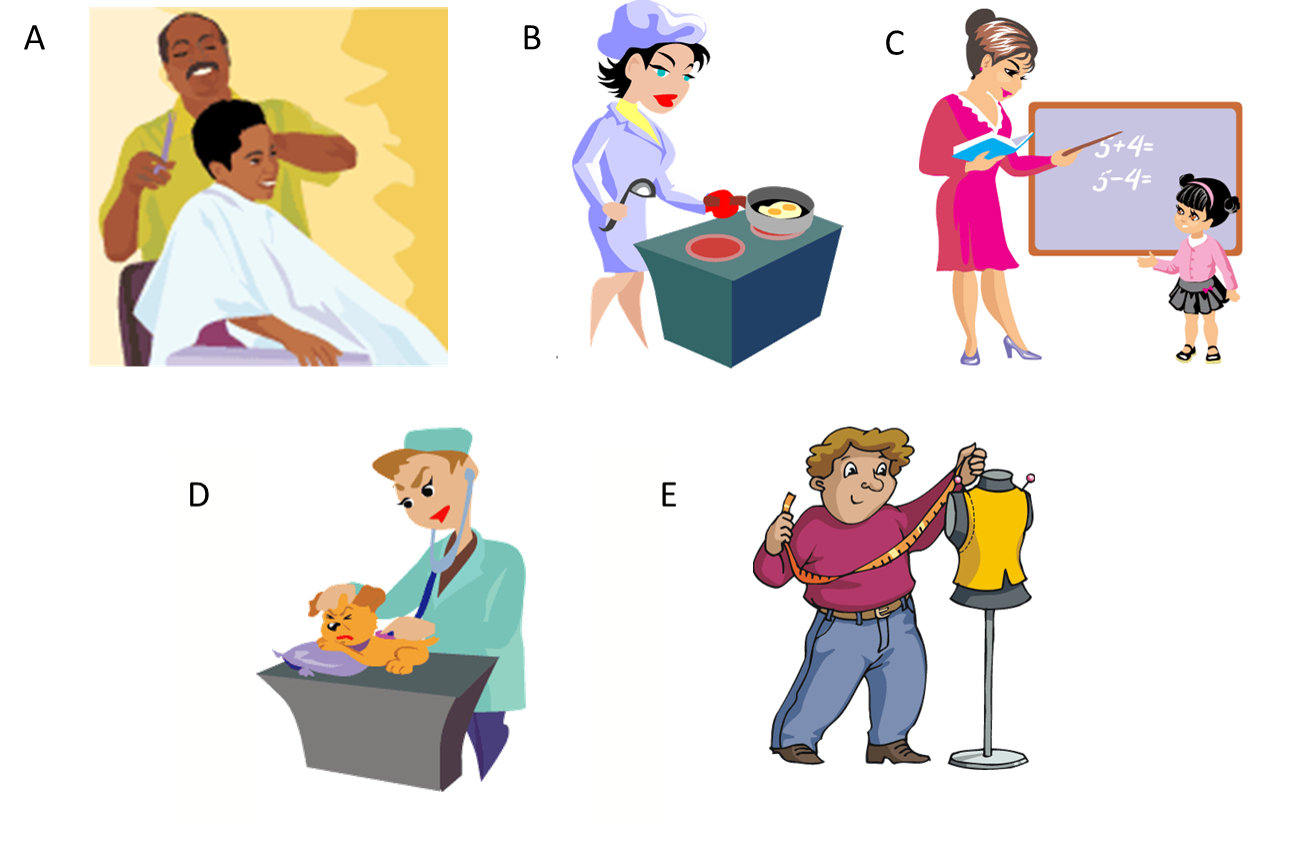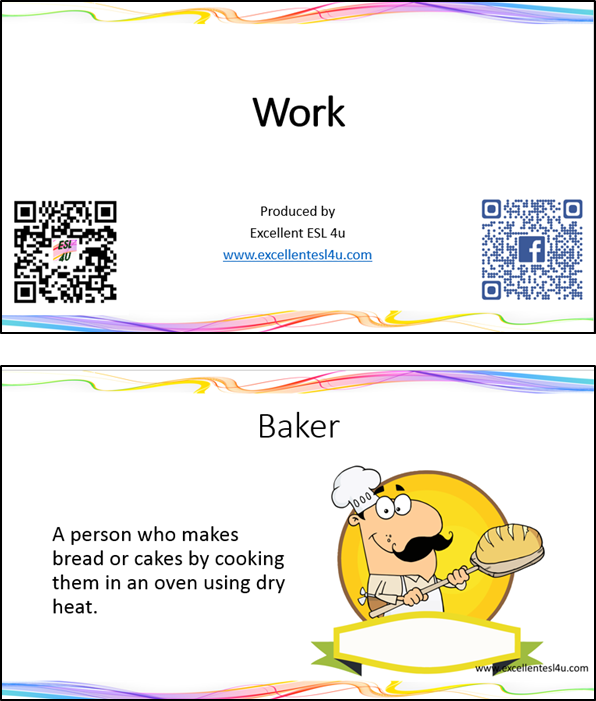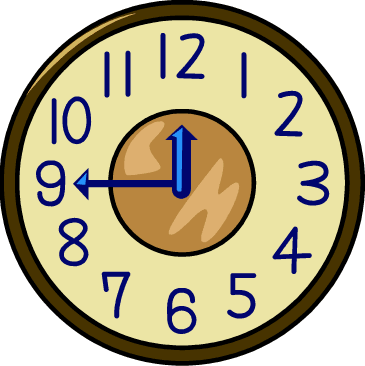ESL Work Vocabulary
Work is very important, and being able to use ESL work vocabulary to describe employment and occupations is also very important.

If you want to live in another country you will probably need to get a job. This page will help you learn useful vocabulary that will help you. The work vocabulary list on his page has lots of vocabulary items for you to learn and simple definitions so you can understand what they mean. After the vocabulary list there are flashcards of the vocabulary that you can download and use to learn all the items.
Then finally the list has been recorded being spoken by a native English speaker and is included in two forms. One for you to just listen to and the other for you to watch a video of the flashcards at the same time as listening to the pronunciation.
After that there are the three ESL work vocabulary exercises for you to do to test your knowledge of the vocabulary items. The exercises are as follows:
- Identify the definition of a word.
- Identify the meaning of a definition.
- Identify pictures of vocabulary items.
ESL Work Vocabulary List with Definitions
The following list of ESL work vocabulary has many words that you should learn to be able to talk about work. Following the list there are some flashcards with pictures of many of the ESL work vocabulary items that you can download. Then there are the recordings of the list being spoken by a native English speaker so you can hear the pronunciation.
Application: A form or paper that indicates interest in a particular place of employment. (noun)
Apply: To ask formally for a job, usually in writing. (verb)
Apprentice: A person who learns a job or skill by working for a fixed period of time for someone who is very good at that job or skill. (noun)
Baker: A person who makes bread or cakes by cooking them in an oven using dry heat. (noun)
Barber: A person who shaves men’s beards and cuts men’s hair. (noun)
Bartender: A person who makes and serves alcoholic drinks at a pub, night club or bar. (noun)
Benefits: Things that an employer may offer an employee in addition to their wages, such as health insurance, annual or sick leave, paid vacation, etc. (noun)
Butcher: A person who prepares meat to be sold to customers. (noun)
Career: A profession for which one trains; a job or series of jobs that you do during your working life. (noun)
Chambermaid: Someone who cleans and tidies rooms. (noun)
Chef: A professional cook who is usually in charge of a kitchen in a restaurant. (noun)
Clerk: A person who does general office work. (noun)
Cook: Someone who prepares and cooks food for eating at home or in a restaurant. (noun)
Coach: A person who teaches or trains an athlete or performer. (noun)
Craftsperson: A person who makes beautiful objects by hand. (noun)
Doctor: A person who is trained and licensed to treat sick and injured people. (noun)
Earn: To receive something in return for work or services done. (verb)
Employ: To use or get the services of someone to do a particular job. (verb)
Employee: A person who works for another person or for a company for wages or salary. (noun)
Employer: A person or company that has people who do work for wages or salary. (noun)
Employment: The act of using or getting the services of someone to do a particular job. (noun)
Farmer: A person who cultivates land or crops or raises animals. (noun)
Fire fighter: A person who works to put out fires. (noun)
Fisherman: A person who catches fish. (noun)
Fishmonger: Someone who prepares and sells fish. (noun)
Flight attendant: A person who serves food and takes care of passengers on an airplane. (noun)
Full-time job: A job working at least 35 hours a week, usually five days a week. (noun phrase)
Garbageman: A person who collects and removes garbage. (noun)
Hair dresser: A person who cuts and styles hair. (noun)
Hire: To give work or a job to someone in exchange for wages or a salary. (verb)
Intern: A student or recent graduate who works for a period of time at a job in order to get experience. (noun)
Janitor: Someone who cleans a building and makes minor repairs. (noun)
Jeweler: A person who makes jewelry. (noun)
Job: A specific task or piece of work; the regular work a person does to earn money; a specific task or project that is one’s responsibility. (noun)
Jobless: Having no job. (adjective)
Judge: (1) Someone who has the power to make decisions on cases brought before a court of law. (noun) (2) Someone who decides the winner in a contest or competition. (noun)
Labour: Practical work, especially that which involves physical effort. (noun)
Labourer: A worker, especially someone who does practical work with their hands. (noun)
Lawyer: A person whose job is to guide and assist people in matters relating to the law. (noun)
Leave: A period of time when someone has special permission to be away from a job. (noun)
Mechanic: Someone whose job is repairing the engines of vehicles and other machines. (noun)
Occupation: The work that a person does; a person’s job or profession. (noun)
Overtime: The time worked in excess of a standard day or working hours. (noun)
Pay slip: A slip of paper included with a person’s salary payment. (noun)
Part-time job: A job working only a few hours or days per week. (noun phrase)
Pharmacist: A person whose job is to prepare and sell the drugs and medicines that a doctor prescribes for patients. (noun)
Porter: Someone who carries other people’s bags and luggage. (noun)
Plumber: Someone who supplies and connects or repairs water pipes. (noun)
Profession: A type of job that requires special education, training, or skill. (noun)
Probation: A period of time at the start of a new job when you are watched and tested to see if you are suitable for the job. (noun)
Qualifications: An ability, characteristics, or experience that makes you suitable for a particular job or activity. (noun)
Receptionist: A person who greets visitors at an office. (noun)
Reference: A person who knows you and is willing to describe and usually praise you to support you when you are trying to get a job; a statement as to a person’s character or ability. (noun)
Resume: A short written description of your education, qualifications, and previous employment that you send to an employer when you are trying to get a job; also sometimes called a curriculum vitae or CV. (noun)
Salary: The amount of money that an employee is paid each year. (noun)
Sailor: A person who works on a ship as part of the crew. (noun)
Secretary: A person whose job is to handle records, letters, etc. in an office. (noun)
Shifts: The time period during which you are at work. (noun)
Surgeon: A person who operates on people who are sick. (noun)
Tailor: Someone who designs, makes, alters or repairs garments. (noun)
Teacher: Someone who works in a school and educates young people. (noun)
Technician: Someone who organizes and repairs technical equipment. (noun)
Undertaker: A person whose job is to prepare dead bodies that are going to be buried or cremated and to organize funerals. (noun)
Vacancy: A job or position that is available to be taken. (noun)
Vet: A person who is trained to give medical care and treatment to animals. (noun)
Volunteer position: A job in which the person works but does not get paid. (noun phrase)
Wage: The amount of money that a worker is paid based on the number of hours or days worked. (noun)
Workload: The amount of work to be done in a period of time. (noun)
Worker: A person who does a particular job to get money. (noun)
Vocabulary Flashcards for Work Words
Click on either the picture or link below to download the flashcards so you can print them and use them anywhere to learn the ESL work vocabulary.
Spoken Work Vocabulary
Below are two recordings of the ESL work vocabulary being spoken by a native English speaker. The first is a recording that you can just listen to, while the second is a video of the flashcards being shown with the correct pronunciation for each word.
ESL Work Vocabulary Exercises
Exercise 1 – Correct Definition

In this ESL work vocabulary task you need to look at the vocabulary item given in each question and decide which definition (A-D) in each question is correct. Once you have finished you can click the get score link at the end of the exercise to see how well you did.
ESL Work Vocabulary Definitions
Choose the correct definition for the work vocabulary in this quiz.
Exercise 2 – Correct Meaning
In the next ESL work vocabulary activity you are given a definition in each question and have to decide which word (A-D) matches it. Again you can click the get score button to see how well you did.
ESL Work Vocabulary Identification of Meaning
Choose the word that matches the definition given in each of the five questions in this quiz.
Exercise 3 – Identify Picture
For this ESL work vocabulary exercise you have been given five pictures, and in each question you need to decide which word (A-D) matches the corresponding picture. As before, you can click the get score button to see the correct answers when you have finished.

ESL Work Vocabulary Picture Descriptions
Identify the best description for each of the images (A-E) given above that correspond to the five questions in this quiz.
Other Pages about Work that You Might Like
ESL Work Conversations
ESL Work Listening
ESL Work Reading
ESL Work Writing
ESL 4u home › Vocabulary › Work


|
|




New! Comments
Have your say about what you just read! Leave me a comment in the box below.